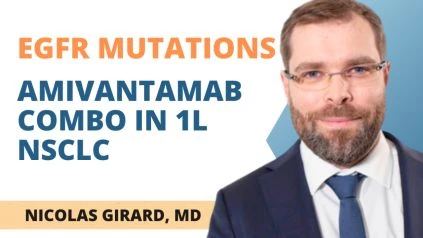Date: 11/15/2023
In a significant development in the field of oncology, Nicolas Girard, MD, played a role in the approval of Amivantamab for the treatment of patients with advanced non-small-cell lung cancer (NSCLC) harboring epidermal growth factor receptor (EGFR) exon 20 insertions. The approval specifically targets individuals who have experienced disease progression during or after platinum-based chemotherapy, representing an advancement in therapeutic options.
The approval stems from a phase 3 international randomized trial overseen by Dr. Nicolas Girard and colleagues. In this trial, 308 patients with advanced NSCLC and EGFR exon 20 insertions, previously untreated with systemic therapy, were assigned in a 1:1 ratio to receive intravenous Amivantamab plus chemotherapy (Amivantamab–chemotherapy) or chemotherapy alone. The primary outcome assessed was progression-free survival, as determined by blinded independent central review.
The results of the trial were impressive. Patients in the Amivantamab–chemotherapy group exhibited significantly longer progression-free survival compared to those in the chemotherapy-alone group. The median progression-free survival was 11.4 months for the Amivantamab–chemotherapy group, as opposed to 6.7 months for the chemotherapy-alone group. The hazard ratio for disease progression or death was 0.40, with a 95% confidence interval of 0.30 to 0.53, underlining the clinical benefit of the combination therapy.
At the 18-month mark, progression-free survival rates further underscored the superiority of Amivantamab–chemotherapy, with 31% of patients in this group compared to 3% in the chemotherapy-alone group. Additionally, a complete or partial response at data cutoff was reported in 73% of the Amivantamab–chemotherapy group and 47% of the chemotherapy-alone group (rate ratio, 1.50; 95% CI, 1.32 to 1.68; P<0.001).
An interim overall survival analysis, with 33% maturity, indicated a favorable trend in favor of Amivantamab–chemotherapy, with a hazard ratio for death of 0.67 (95% CI, 0.42 to 1.09; P=0.11).
The predominant adverse events associated with Amivantamab–chemotherapy were reversible hematologic and EGFR-related toxic effects. While 7% of patients discontinued Amivantamab due to adverse reactions, the overall efficacy and safety profile demonstrated the potential of this treatment approach.
In conclusion, under the leadership of Dr. Nicolas Girard, MD, the utilization of Amivantamab–chemotherapy has emerged as a first-line treatment for patients with advanced NSCLC bearing EGFR exon 20 insertions. This study heralds a new era in the management of this subset of lung cancer patients, offering a significantly improved therapeutic option that promises both enhanced efficacy and a manageable safety profile.

